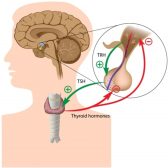Definition
noun, plural: prolactin-releasing hormones
A polypeptide hormone originating in the hypothalamus, and whose action is to stimulate the secretion of the prolactin in the pituitary gland
Supplement
Prolactin is a hormone known for its role in milk production in female mammals. Apart from this, it also has a role in metabolism, the regulation of the immune system, and the development of the pancreas.
It is secreted by the pituitary gland. The prolactin-releasing hormone is hypothesized because there are few prolactin-releasing hormones were described whereas certain hormones or factors that exclusively inhibit the release of prolactin were identified. Dopamine, leukemia inhibitory factor and certain prostaglandins are some of the factors associated with an inhibitory action against the release of prolactin.
Hormones such as thryrotropin-releaseing hormone, oxytocin, vasoactive intestinal peptide, and estrogen were described to have a stimulating effect on the release of prolactin however these hormones or factors are not exclusively for such function. Nevertheless, the prolactin-releasing peptide described in 1998 may be considered as an exclusive prolactin-releasing hormone but full research in this regard has not been fully elucidated yet.1
The release of prolactin is associated with the action of a prolactin-releasing hormone (or factor).
Abbreviation / Acronym: PRH or PRLH
Synonym(s):
- prolactoliberin
- prolactin-releasing factor
See also:
- Prolactin release-inhibiting hormone
- prolactin
Reference(s):
1 Prolactin-releasing hormone. Wikipedia.org. Retrieved from https://en.wikipedia.org/wiki/Prolactin-releasing-hormone



